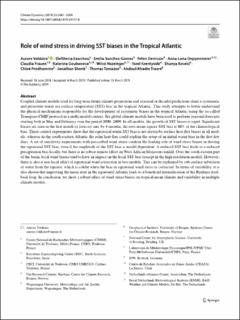Role of wind stress in driving SST biases in the tropical Atlantic
Voldoire, Aurore; Exarchou, Eleftheria; Sánchez-Gómez, Emilia; Demissie, Teferi Dejene; Deppenmeier, Anna-Lena; Frauen, Claudia; Goubanova, Katarina; Hazeleger, Wilco; Keenlyside, Noel; Koseki, Shunya; Prodhomme, Chloé; Shonk, Jonathan; Toniazzo, Thomas; Traoré, Abdoul-Khadre
Journal article, Peer reviewed
Published version

Åpne
Permanent lenke
https://hdl.handle.net/11250/2728123Utgivelsesdato
2019-03-13Metadata
Vis full innførselSamlinger
- Geophysical Institute [1198]
- Registrations from Cristin [9791]
Sammendrag
Coupled climate models used for long-term future climate projections and seasonal or decadal predictions share a systematic and persistent warm sea surface temperature (SST) bias in the tropical Atlantic. This study attempts to better understand the physical mechanisms responsible for the development of systematic biases in the tropical Atlantic using the so-called Transpose-CMIP protocol in a multi-model context. Six global climate models have been used to perform seasonal forecasts starting both in May and February over the period 2000–2009. In all models, the growth of SST biases is rapid. Significant biases are seen in the first month of forecast and, by 6 months, the root-mean-square SST bias is 80% of the climatological bias. These control experiments show that the equatorial warm SST bias is not driven by surface heat flux biases in all models, whereas in the south-eastern Atlantic the solar heat flux could explain the setup of an initial warm bias in the first few days. A set of sensitivity experiments with prescribed wind stress confirm the leading role of wind stress biases in driving the equatorial SST bias, even if the amplitude of the SST bias is model dependent. A reduced SST bias leads to a reduced precipitation bias locally, but there is no robust remote effect on West African Monsoon rainfall. Over the south-eastern part of the basin, local wind biases tend to have an impact on the local SST bias (except in the high resolution model). However, there is also a non-local effect of equatorial wind correction in two models. This can be explained by sub-surface advection of water from the equator, which is colder when the bias in equatorial wind stress is corrected. In terms of variability, it is also shown that improving the mean state in the equatorial Atlantic leads to a beneficial intensification of the Bjerknes feedback loop. In conclusion, we show a robust effect of wind stress biases on tropical mean climate and variability in multiple climate models.
